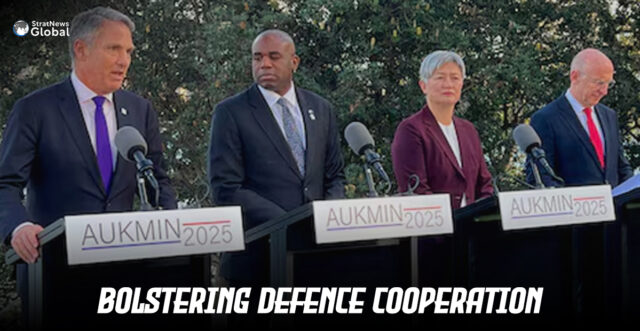Australia announced on Saturday that it had signed a treaty with Britain to strengthen cooperation on the AUKUS nuclear submarine partnership over the next 50 years.
The AUKUS pact, agreed upon by Australia, Britain and the U.S. in 2021, aims to provide Australia with nuclear-powered attack submarines from the next decade to counter China’s ambitions in the Indo-Pacific. U.S. President Donald Trump’s administration announced a formal review of the pact this year.
Defence Minister Richard Marles said in a statement that the bilateral treaty was signed with Britain’s Defence Secretary John Healey on Saturday after a meeting in the city of Geelong, in Victoria state.
“The Geelong Treaty will enable comprehensive cooperation on the design, build, operation, sustainment, and disposal of our SSN-AUKUS submarines,” the statement said.
50 Years’ Commitment
The treaty was a “commitment for the next 50 years of UK-Australian bilateral defence cooperation under AUKUS Pillar I”, it said, adding that it built on the “strong foundation” of trilateral AUKUS cooperation.
Britain’s Ministry of Defence said this week that the bilateral treaty would underpin the two allies’ submarine programmes and was expected to be worth up to 20 billion pounds ($27.1 billion) for Britain in exports over the next 25 years.
AUKUS is Australia’s biggest-ever defence project, with Canberra committing to spend A$368 billion over three decades on the programme, which includes billions of dollars of investment in the U.S. production base.
Australia, which this month paid A$800 million to the U.S. in the second instalment under AUKUS, has maintained it is confident the pact will proceed.
The defence and foreign ministers of Australia and Britain held talks on Friday in Sydney on boosting cooperation, coinciding with Australia’s largest war games.
As many as 40,000 troops from 19 countries are taking part in the Talisman Sabre exercises held from July 13 to August 4, which Australia’s military has said are a rehearsal for joint warfare to maintain Indo-Pacific stability.
Britain has significantly increased its participation in the exercise co-hosted by Australia and the United States, with aircraft carrier HMS Prince of Wales taking part this year.
(With inputs from Reuters)





